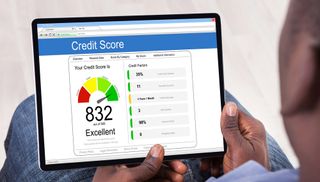How to get your credit score
How to get insight into your financial health

Your credit score tells creditors and lenders how likely you are to pay your bills and cover your debts on time and in full. The lower your score, the higher the risk they take on you, and the harder it is to get approved for a new credit card, mortgage or car loan.
Credit scores fall on a scale from 300 to 850. While each financial institution determines what constitutes good or bad credit for their products, a score in the mid-700s or higher will generally give you more options.
There are several important facts about your credit score you need to know:
Your credit score is a reflection of your risk at a single point in time. Scores change frequently as your credit balance, your payment history and other factors that make up your score change. This is why it's helpful to check your score on a regular basis.
You have more than one credit score. Scores may vary depending on which credit-reporting bureau — Experian, Equifax or TransUnion — provides the data. Similarly, there are several scoring models, or formulas, used to calculate scores, with the most common being FICO 8, followed by VantageScore 3.0. Credit bureaus sometimes have their own "educational" scores. The numbers may be similar, but there could also be a 10-plus point gap.
Different lenders may use different scores. Because you have a handful of credit scores at any point in time, you may not know the exact number your lender sees. As Michelle Petrowski, an Arizona-based certified financial planner with Being in Abundance explains, credit-card companies commonly rely on FICO 8 using data from all three credit bureaus, but banks look at other versions of FICO when approving mortgages.
Here's how to get your credit score.
Sign up to get the BEST of Tom’s Guide direct to your inbox.
Upgrade your life with a daily dose of the biggest tech news, lifestyle hacks and our curated analysis. Be the first to know about cutting-edge gadgets and the hottest deals.
How to get your credit score for free
If you have a credit card or auto loan, you may be able to get your credit score — updated monthly — from your lender at no cost and with no catch by logging into your online account or viewing your statement.
You'll also generally see information about credit balances and other factors that impact your score, similar to what's provided in a complete credit report.
"If it's free, why not check it monthly to stay on top of your progress," says Petrowski.
Note that the score provided by a creditor or lender may not be a FICO 8 score. Both Chase and American Express, for example, offer VantageScore 3.0 scores based on Experian and TransUnion data, respectively.
There are two other ways to get your credit score for free. One is to work with a non-profit credit counselor or a housing counselor, both of whom may be able to pull a free credit score as part of their budget-counseling or debt-management services.
Finally, there are a handful of credit-score services that offer score reports for free — sort of. Credit Karma remains free for consumers because it relies on targeted advertising using your credit data. Scores from Credit Karma utilize TransUnion and Equifax information.
NerdWallet is also funded by advertising and offers VantageScore 3.0 scores from TransUnion. Experian provides FICO 8 scores directly at no cost in exchange for your consent to receive product, service and credit offers.
Credit Sesame, meanwhile, provides scores based on TransUnion data for its free customers, while paid subscribers get scores from all three bureaus updated monthly.
Before you sign up for a "free" credit score, check whether you are required to provide a credit-card number. Some services may have "free" trials but will charge your card at a later date if you forget to cancel.
Paid alternatives for requesting your credit score
One final option for seeing your credit score is to buy it directly from credit-reporting bureaus. You can sign up for a one-time report from one bureau ($19.95) or all three ($59.85) at myFICO.com, or you can subscribe to identity theft protection plans that may include your credit reports, credit scores and and credit-monitoring services.
How is my credit score calculated?
Your credit score incorporates a handful of factors from your financial past and present:
- Payment history: On-time, late and missed payments
- Credit balance and utilization: What percentage of available credit you're using and how much you owe
- Credit age: How long your accounts have been open
- Credit inquiries: Recent applications for new credit
- Credit types: The blend of credit cards and loans
- Negative marks: Any history of collections, foreclosures or bankruptcies
Again, the various scoring models may weigh each factor differently, which is why not all scores are equal. Plus, your credit reports — where some of the data for your score comes from — may not be identical across the three credit bureaus. The exact formula for credit-score calculations is a well-kept secret.
Bottom line
Your credit score provides a quick look at your creditworthiness to help lenders decide whether you are worth the risk. You can get credit scores for free from your credit-card or loan company, although this is just one variation of your score at one point in time.
To get a better picture of fluctuations — especially if you've missed a payment, made a big purchase on credit or opened a new account — consider requesting your credit score frequently and from several sources.
Next: Here's how to pay off credit card debt and save on interest.
Emily Long is a Utah-based freelance writer who covers consumer technology, privacy and personal finance for Tom's Guide. She has been reporting and writing for nearly 10 years, and her work has appeared in Wirecutter, Lifehacker, NBC BETTER and CN Traveler, among others. When she's not working, you can find her trail running, teaching and practicing yoga, or studying for grad school — all fueled by coffee, obviously.

